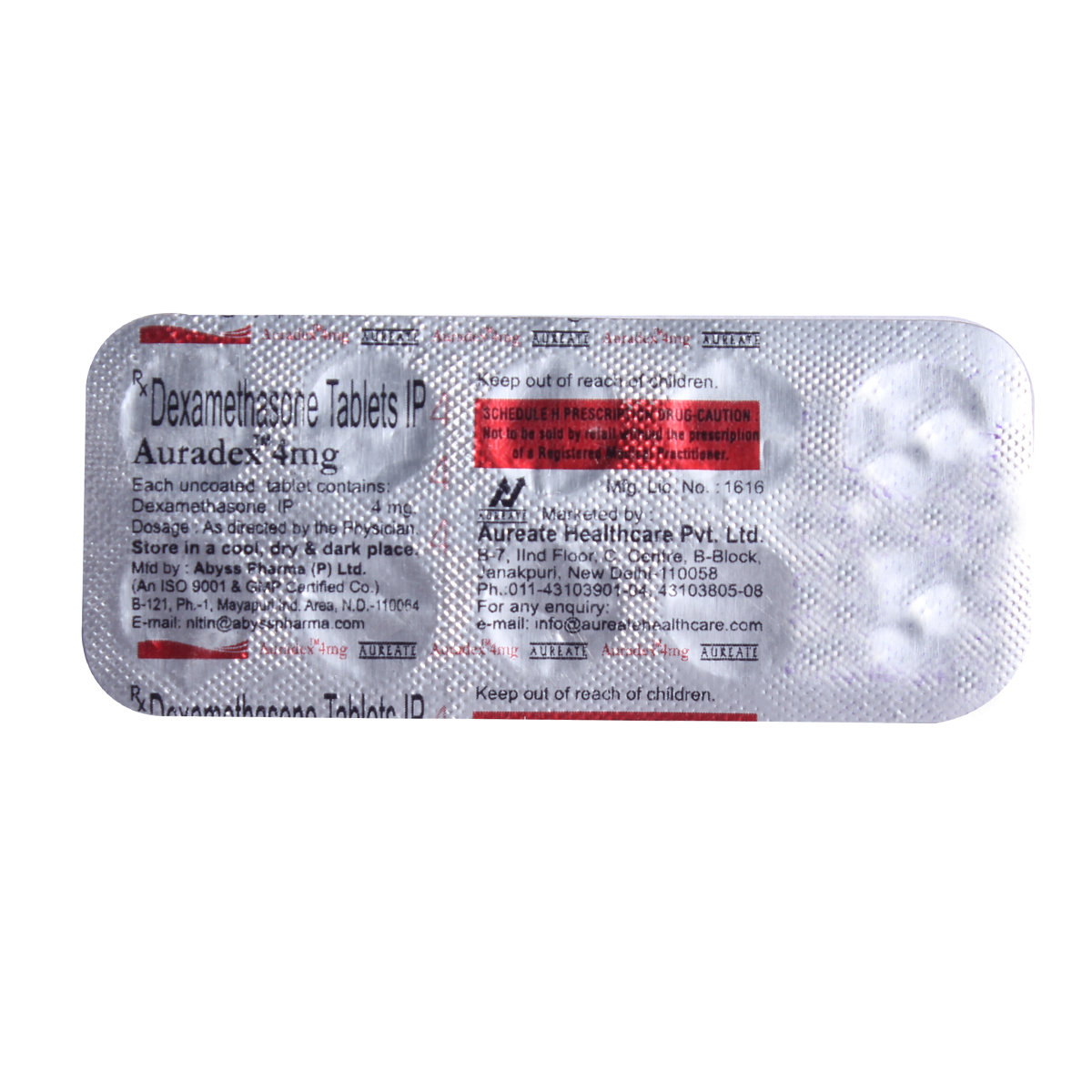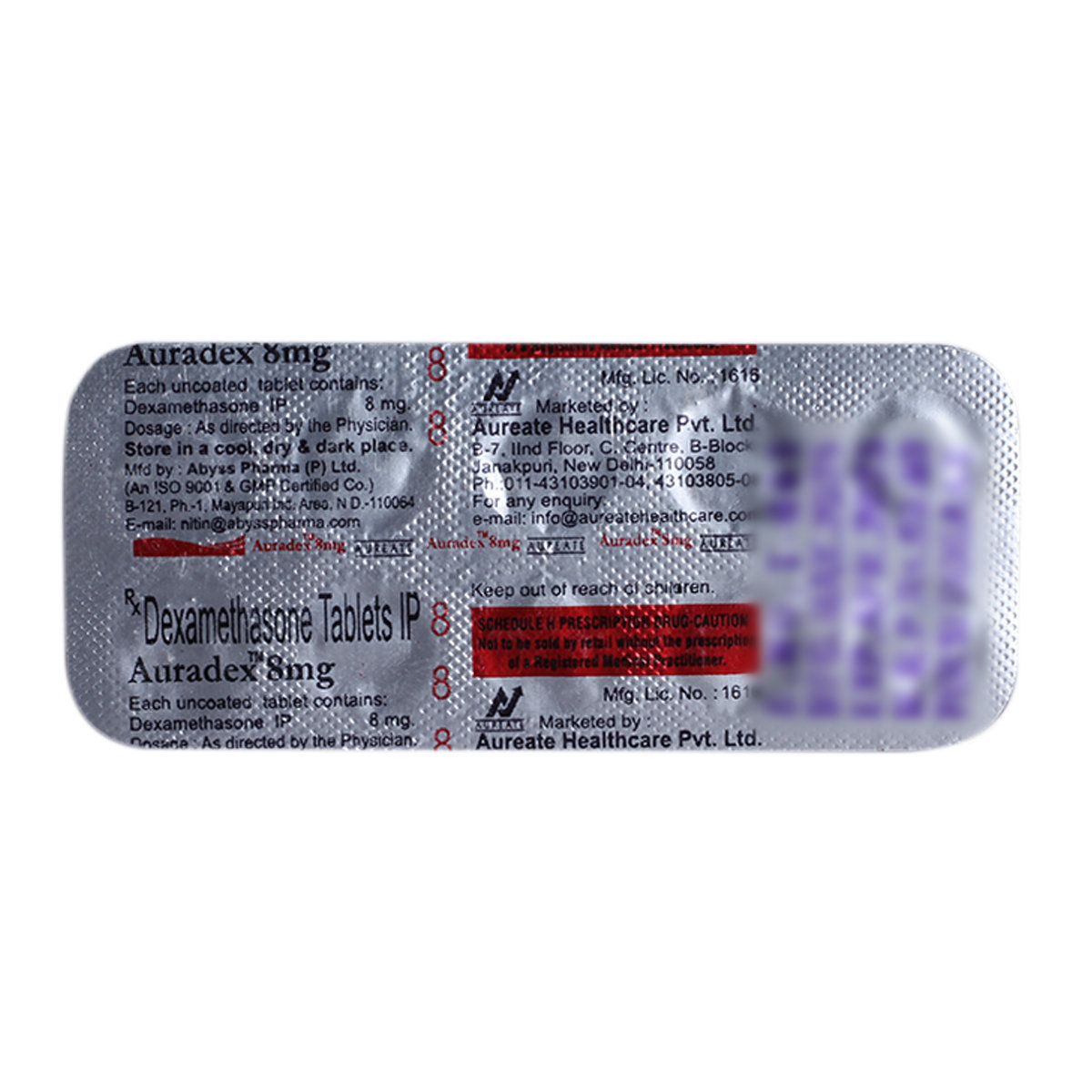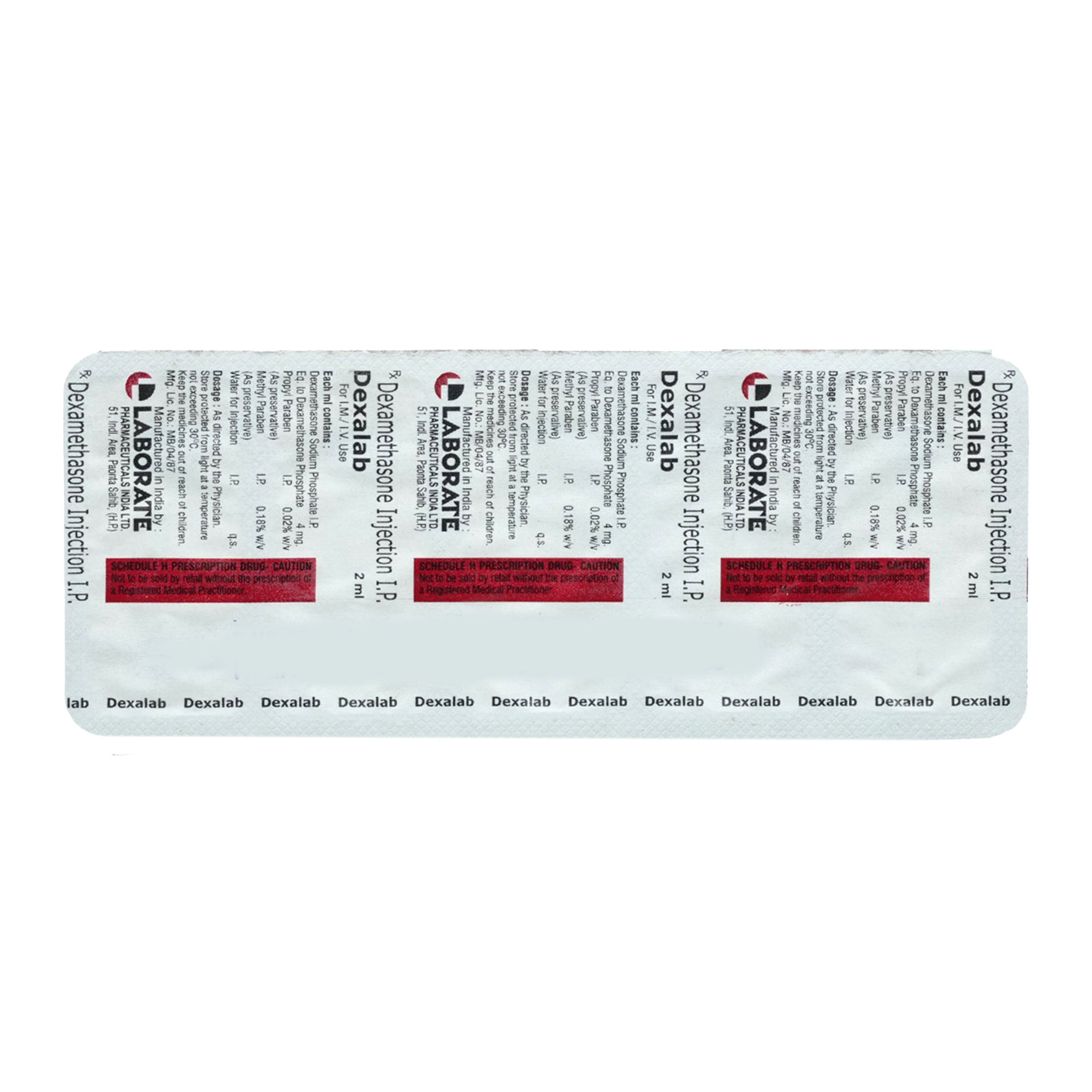Dexamethasone
About Dexamethasone
Dexamethasone belongs to a class of steroid (corticosteroid) medicine. When your body does not produce enough of this hormone, it is often utilized to replace it. It treats various medical conditions, including allergic or inflammatory and autoimmune conditions. Furthermore, it is approved for the treatment of coronavirus disease 2019 (COVID-19) in adult and adolescent patients (aged 12 years and older with a body weight of at least 40 kg) who require supplemental oxygen therapy.
Dexamethasone contains dexamethasone, a steroid with both anti-inflammatory and immunosuppressant activity. Anti-inflammatory activity relieves the symptoms of inflammatory conditions such as redness, swelling, and tenderness caused by various medical conditions. On the other side, immunosuppressant activity helps to calm your immune system. As a result, it can aid in autoimmune diseases, in which your immune system erroneously destroys your own tissues.
Dexamethasone should be taken as prescribed by the physician. Some people may experience weight gain, indigestion, headache, dizziness, rash, fluid retention (swelling in your hands or ankles), sleep problems, mild mood changes and nausea. If the side effects persist or worsen, please consult your doctor.
Dexamethasone is recommended not to take if you are allergic to dexamethasone or any of the other ingredients of this medicine or any signs of an allergic reaction include a rash, itching or shortness of breath or If you have an infection that affects the whole body or If you need to have a vaccination, particularly with ‘live virus’ vaccines. Before obtaining the Dexamethasone, notify your doctor about your medical history and any other medications you are currently taking to rule out any potentially harmful effects. Dexamethasone should be used in pregnant and nursing women only if clinically needed; so, if you are a pregnant woman or nursing mother, do not consume Dexamethasone without consulting your doctor. Dexamethasone may cause a reduction in mental awareness; thus, avoid using machinery or driving.
Uses of Dexamethasone
Medicinal Benefits
Dexamethasone is a steroid (corticosteroids) medication. Corticosteroids occur naturally in the body and contribute to overall health and well-being. Increasing your body's corticosteroid levels (such as dexamethasone) is an effective strategy for treating various disorders involving inflammation. Dexamethasone decreases inflammation, which might otherwise worsen your disease. You must take it daily to get the most out of this medication. It is also approved for the treatment of coronavirus disease 2019 (COVID-19) in adults and adolescents (aged 12 years and older with a body weight of at least 40 kg) who require supplemental oxygen therapy.
Directions for Use
Storage
Side Effects of Dexamethasone
- Weight gain
- Indigestion
- Sleep problems
- Mild mood changes
- Fluid retention (swelling in your hands or ankles)
- Increased appetite
- Nausea
- Vomiting
- Upset stomach
- Headache
- Dizziness
- Increased sweating
- Rash
Drug Warnings
Let your doctor know before prescribing Dexamethasone if you are allergic to any content of this medicine or sulphites. You should disclose to your doctor if you have received any live virus vaccines. You should discuss with your doctor if you have fungal infections, amoebiasis, myasthenia gravis, peptic ulcer, osteoporosis, psychoses, eye infections, glaucoma, mental conditions, TB, bacteraemia (viable bacteria in the bloodstream), joint, liver, kidney, or heart conditions and septic arthritis resulting from gonorrhoea or tuberculosis. Let your doctor also know if you are pregnant, planning for pregnancy or breastfeeding before receiving this medicine. Inform your doctor immediately if you notice mood changes or have depression and strange thoughts while Dexamethasone therapy. Do not abruptly stop taking Dexamethasone as you might feel severe tiredness, weakness, body aches, and joint pain, which are withdrawal symptoms of Dexamethasone. Consult your doctor, and your dose be lowered gradually to avoid any withdrawal symptoms.
Drug Interactions
Drug-Drug Interactions: Dexamethasone may interact with nonsteroidal anti-inflammatory drugs (e.g. aspirin), anticonvulsants (e.g. phenytoin), sedative-hypnotic medications (e.g. phenobarbital, primidone), antibiotics (e.g. rifampicin, rifabutin), anticancer (e.g. aminoglutethimide, methotrexate), anticoagulant (e.g. warfarin), antiretroviral drugs (e.g. ritonavir, darunavir, indinavir), and medicines used to treat epilepsy, pain and manic depression (e.g. carbamazepine).
Drug-Food Interactions: No interactions found/established.
Drug-Disease Interactions: If you ever had fungal infections, epilepsy, schizophrenia, amoebiasis, myasthenia gravis, peptic ulcer, osteoporosis, psychoses, eye infections, glaucoma, mental conditions, diabetes, TB, bacteraemia (viable bacteria in the bloodstream), joint, liver, kidney, or heart conditions and septic arthritis resulting from gonorrhoea or tuberculosis or have or had a recent vaccination inform your doctor before taking Dexamethasone.
Drug-Drug Interactions Checker List:
Safety Advice

Alcohol
cautionNo interaction was found. However, it is advisable not to take or limit alcohol as a precautionary measure.

Pregnancy
cautionIf you are pregnant, inform your doctor. The doctor will then decide if the Dexamethasone is suitable for you. Dexamethasone is given to pregnant women only if the doctor thinks the benefits outweigh the risks.

Breast Feeding
cautionInform your doctor if you are a nursing mother. The doctor will then decide if the Dexamethasone is suitable for you. Dexamethasone is given to nursing mothers only if the doctor thinks the benefits outweigh the risks.

Driving
cautionDexamethasone may cause a reduction in mental awareness; thus, avoid using machinery or driving.

Liver
cautionInform your doctor before prescribing the Dexamethasone if you have a history of or ongoing liver disease. Your doctor will adjust the dose of this medicine if required based on your condition.

Kidney
cautionInform your doctor before prescribing the Dexamethasone if you have a history of or ongoing kidney disease. Your doctor may carry out extra checks while you are taking this medicine.

Children
cautionDexamethasone may affect the growth of children. Therefore, inform your doctor if your child is not growing normally while using the Dexamethasone.
Habit Forming
Diet & Lifestyle Advise
Diet & Lifestyle for Allergic or inflammatory conditions:
- Consume antioxidant-rich food. Blueberries, tomatoes, cherries, squash, and bell peppers are highly antioxidants.
- Consuming probiotic-rich foods aids in the development of the immune system's resistance to allergies.
- Consume foods rich in quercetin (a flavonoid), such as apples, cherries, spinach, broccoli, and blueberries.
- Include seasonal fruits, vegetables, whole grains, healthy fats, and fish in your daily diet.
- Limit your intake of foods that may cause allergies, such as dairy products, soy, eggs, and nuts.
- Limit the consumption of foods high in sugar that may aggravate inflammation.
- Reducing stress and having a regular sleep schedule might be beneficial.
- Avoid processed meats, refined carbohydrates, sugar, trans fats, and alcohol, as they may aggravate inflammation.
Diet & Lifestyle for Covid-19:
- Remember always to wear a mask when you're around other people. Wearing a mask aids in the prevention of illness spread.
- Take care of your mental health. Fear and anxiety can hamper the immune system as well. Therapy, yoga, and meditation effectively allow the mind a state of peace.
- Keep a social distance and avoid social gatherings.
- Please do not touch your eyes, nose or mouth if your hands are not clean.
- Hands should be washed with soap and water or an alcohol-based sanitiser on a regular basis.
- All surfaces should be cleaned and disinfected on a regular basis.
- Gargling with salt water and inhaling steam would be beneficial.
- Never exchange personal objects that have been contaminated with bodily fluids or blood, such as razor blades or toothbrushes.
- Never share used needles and other injections or medical devices, as they may spread viruses.
- Consume a well-balanced diet. Consume vitamin and nutrient-rich foods like dark green, yellow, orange, and red vegetables and fruits to enhance your immune system. Choose lean protein and whole carbohydrates over-processed foods.
- Consume no raw meat or eggs. Consume boiled and cooked meat, poultry, or seafood.
- If you have nausea or vomiting, eat bland, low-fat foods and avoid spicy or greasy foods.
- Spending time with family or doing whatever makes you happy might help you minimise emotional and physical stress.
Patients Concern
Disease/Condition Glossary
Allergy: Allergy is a condition that occurs when the immune system reacts to a foreign substance that is typically not harmful to your body. These foreign substances are known as 'allergens.' Allergic condition varies from person to person. Some might be allergic to certain foods, medications, and seasonal allergies like hay fever, pollen, or pet dander. The symptoms of an allergic reaction include itching, rash, scratchy throat, itchy or watery eyes, hives or itchy red spots on the skin, or allergic rhinitis (which causes sneezing or nasal congestion).
Inflammation: It is a response generated by damage to living tissues. This response is a defence mechanism to protect the body from injury, infection, or disease. The symptoms of inflammation include redness, pain, swelling, heat, or loss of function. Inflammation can be caused due to certain medications, acute and chronic conditions, exposure to foreign materials or irritants your body can't eliminate easily.
Coronavirus disease (COVID-19): Covid-19 is an infectious disease caused by the SARS-CoV-2 virus. Most persons who become ill with Covid-19 will have mild to moderate symptoms and recover without specific therapy. Some, though, will become extremely unwell and require medical assistance. The virus can spread from an infected person's mouth or nose in microscopic liquid particles when they cough, sneeze, speak, sing, or breathe. Fever, cough, tiredness, and loss of taste or smell are the most common side effects of Covid-19.
FAQs
Dexamethasone contains dexamethasone, a steroid with both anti-inflammatory and immunosuppressant activity. Anti-inflammatory activity relieves the symptoms of inflammatory conditions such as redness, swelling, and tenderness caused by various medical conditions. On the other side, immunosuppressant activity helps to calm your immune system. As a result, it can aid in autoimmune diseases such as rheumatoid arthritis, in which your immune system erroneously destroys your own tissues.
If you miss a dose of Dexamethasone, take the missed dose as soon as you remember it. However, if it's almost time for the next dose, do not take a double dose to make up for a missed one.
If you take more Dexamethasone than required, please visit a doctor as it requires immediate medical attention. Excessive intake of Dexamethasone may lead to swelling of the throat, difficulty breathing, or any skin reaction.
Do not abruptly stop taking Dexamethasone as you might feel severe tiredness, weakness, body aches, and joint pain, which are withdrawal symptoms of Dexamethasone. Consult your doctor, and your dose be lowered gradually to avoid any withdrawal symptoms.
If you are about to get vaccinated, especially if it is a live vaccine. In that case, you should notify your doctor that you are taking Dexamethasone because the use of Dexamethasone and immunizations at the same time is not recommended.
Dexamethasone is recommended not to use in people affected with fungal infections. If you have any concerns regarding this, please discuss them with the doctor.
Dexamethasone may increase the risk of Infections and infestations. Therefore, it is advised to stay away from people having chickenpox (herpes simplex), shingles (herpes zoster) or measles.
Corticosteroids have the potential to raise blood glucose levels. Patients may require dosage adjustments for any concurrent diabetes medication.
Dexamethasone is approved for the treatment of coronavirus disease 2019 (COVID-19) in adults and adolescents (aged 12 years and older with a body weight of at least 40 kg) who require supplemental oxygen therapy.







